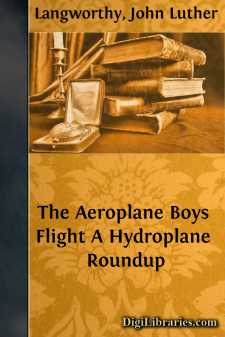Fiction
- Action & Adventure 180
- Biographical 15
- Christian 59
- Classics
- Coming of Age 5
- Contemporary Women 3
- Erotica 8
- Espionage/Intrigue 12
- Fairy Tales, Folklore & Mythology 236
- Family Life 169
- Fantasy 117
- Gay 1
- General 596
- Ghost 32
- Historical 808
- Horror 43
- Humorous 160
- Jewish 25
- Legal 4
- Medical 22
- Mystery & Detective 315
- Political 49
- Psychological 41
- Religious 64
- Romance 159
- Sagas 11
- Science Fiction 730
- Sea Stories 113
- Short Stories (single author) 537
- Sports 10
- Suspense 1
- Technological 8
- Thrillers 2
- Urban Life 31
- Visionary & Metaphysical 1
- War & Military 173
- Westerns 199
Classics Books
Sort by:
CHAPTER I THE BOY FLIERS "It was my mistake, Frank!" "How do you make that out, Andy?" "Simply because I was using the little patent Bird monkey-wrench last in our shop, and should have put it back in the toolbox belonging to the aeroplane. The fact that it isn't here shows that I mislaid it. Give me a bad mark, Frank." "Well, I must say it's a queer stunt for you...
more...
by:
Richard Mead
T is a natural, nor can it be deemed an illaudable curiosity to be desirous of being informed of whatever relates to those who have eminently distinguished themselves for sagacity, parts, learning, or what else may have exalted their characters, and thereby entitled them to a degree of respect superior to the rest of their cotemporaries. The transmission of such particulars, has ever been thought no...
more...
THE BLUE LIGHT "Mother, make Ted stop!" "I'm not doing anything at all, Mother!" "Yes he is, too! Please call him in. He's hurting my doll." "Oh, Janet Martin, I am not!" "You are so, Theodore Baradale Martin; and you've just got to stop!" Janet, or Jan, as she was more often called, stood in front of her brother with flashing eyes and red cheeks....
more...
by:
Anthony Trollope
CHAPTER I. INTRODUCTION. It may be doubted whether a brighter, more prosperous, and specially a more orderly colony than Britannula was ever settled by British colonists. But it had its period of separation from the mother country, though never of rebellion,—like its elder sister New Zealand. Indeed, in that respect it simply followed the lead given her by the Australias, which, when they set up...
more...
APOCOLOCYNTOSIS, OR LUDUS DE MORTE CLAUDII:THE PUMPKINIFICATION OF CLAUDIUS. I wish to place on record the proceedings in heaven October 13 last, of the new year which begins this auspicious age. It shall be done without malice or favour. This is the truth. Ask if you like how I know it? To begin with, I am not bound to please you with my answer. Who will compel me? I know the same day made me free,...
more...
by:
An English Lady
Amiens, Jan. 23, 1795. Nothing proves more that the French republican government was originally founded on principles of despotism and injustice, than the weakness and anarchy which seem to accompany every deviation from these principles. It is strong to destroy and weak to protect: because, deriving its support from the power of the bad and the submission of the timid, it is deserted or opposed by the...
more...
by:
James Lane Allen
I I was happily at work this morning among my butterbeans—a vegetable of solid merit and of a far greater suitableness to my palate than such bovine watery growths as the squash and the beet. Georgiana came to her garden window and stood watching me. "You work those butterbeans as though you loved them," she said, scornfully. "I do love them. I love all vines." "Are you...
more...
by:
Edmund Myer
ARTICLE ONE.THE OLD ITALIAN SCHOOL OF SINGING.The Shibboleth, or trade cry, of the average modern vocal teacher is "The Old Italian School of Singing." How much of value there is in this may be surmised when we stop to consider that of the many who claim to teach the true Old Italian method no two of them teach at all alike, unless they happen to be pupils of the same master. A system, a...
more...
by:
Ian Hay
CHAPTER ONE. OATMEAL AND THE SHORTER CATECHISM. The first and most-serious-but-one ordeal in the life of Robert Chalmers Fordyce—so Robert Chalmers himself informed me years afterwards—was the examination for the Bursary which he gained at Edinburgh University. A bursary is what an English undergraduate would call a "Schol." (Imagine a Scottish student talking about a "Burse"!)...
more...
by:
Peter A. Porter
The printed story of Niagara dates back only three centuries; and during the first three decades of even that period the references to this wonderful handiwork of Nature—which was located in a then unexplored region of a New World, a Continent then inhabited only by warring tribes of superstitious Savages—are few and far between. Three facts relating to this locality—and three only—seem to be...
more...











